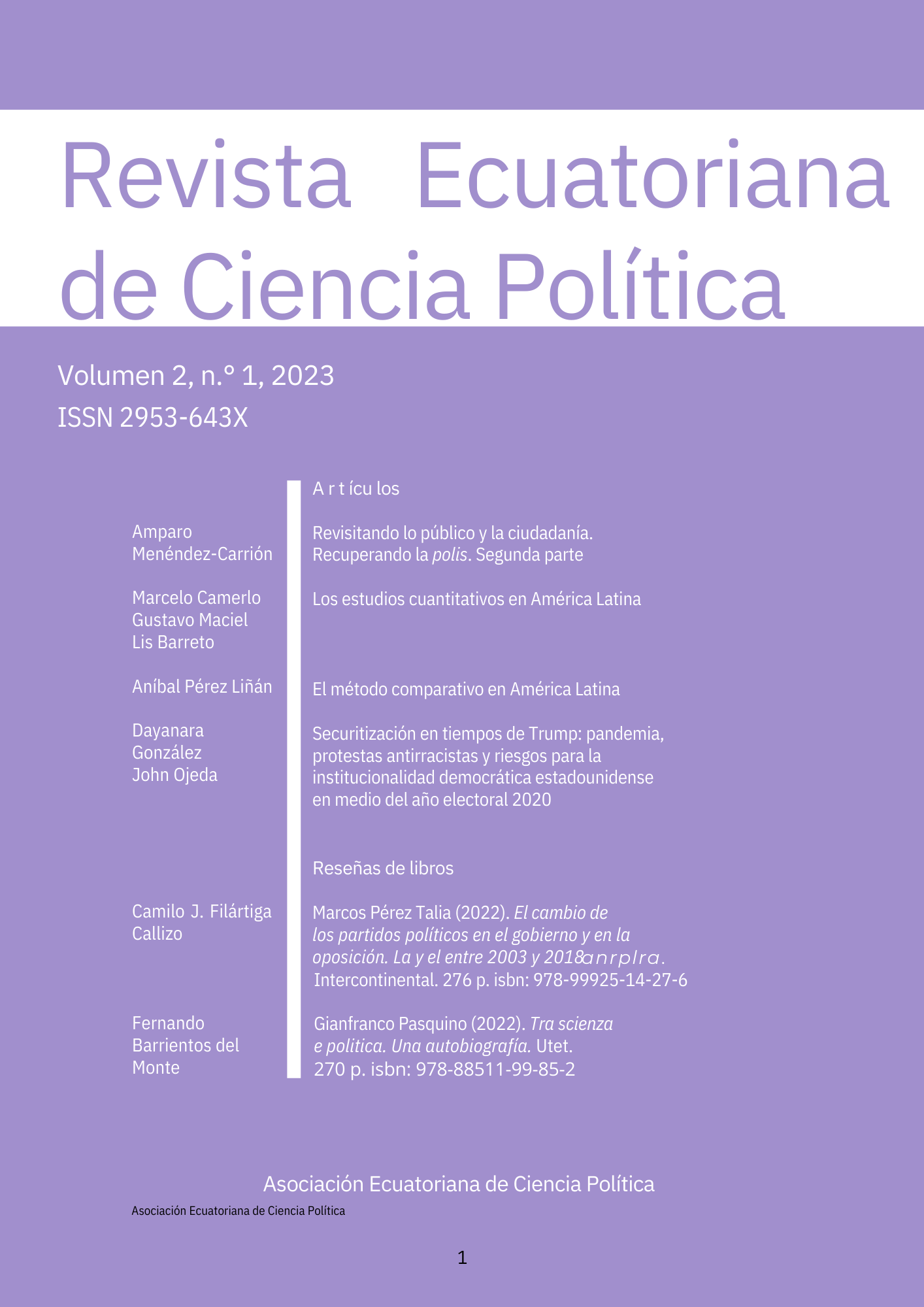El método comparativo en América Latina
DOI:
https://doi.org/10.59352/recp.v2i1.73Keywords:
comparative method, method of agreement, method of difference, qualitative comparative análisis (QCA), information gain indexAbstract
This article introduces the principles of the comparative method and illustrates its application in the Latin American context. The first section identifies the four functions of comparison: the formation of new concepts, descriptive inference, the formulation of explanatory hypotheses, and their verification. The rest of the article introduces three strategies used for explanatory purposes: the comparison of cases with similar outcomes (method of agreement), the comparison of cases with different outcomes (method of difference), and the analysis of causal configurations. Each section illustrates an advanced technique, such as Bayesian comparison, the information gain index, and qualitative comparative analysis (QCA). For ease of reading, a common example exemplifies these designs throughout the text.
References
Referencias
Arjona, A. (2015). Civilian resistance to rebel governance. En A. Arjona, N. Kasfir y Z. Mampilly (Eds.), Rebel governance in civil war (pp 180-202). Cambridge University Press.
Aversa, C. (2016). Pugna de poderes y salidas anticipadas: explicando la modalidad de resolución de las crisis presidenciales. América Latina Hoy, (74), 99-124.
Basabe-Serrano, S. (2014). Some determinants of internal judicial independence:
A comparative study of the courts in Chile, Peru and Ecuador. International Journal of Law, Crime and Justice, 42 (2), 130-145.
Berg-Schlosser, D. y De Meur, G. (2009). Comparative research design: Case and variable
selection. En B. Rihoux y C. C. Ragin (Eds.), Configurational comparative methods: Qualitative Comparative Analysis (qca) and related techniques (pp. 19-32). Sage.
Bulcourf, P. (2015). Guillermo O’Donnell y el desarrollo de la ciencia política en América Latina. En I. Covarrubias (Ed.), Figuras, historias y territorios. Cartógrafos contemporáneos de la indagación política en América Latina (pp. 45-70). Universidad Michoacana de San Nicolás de Hidalgo.
Bulcourf, P., Cardozom, N. y Gutiérrez E. (2014). El desarrollo de la ciencia política men Argentina, Brasil y México: construyendo una mirada comparada. Anuario Latinoamericano,1 (1), 155-184.
Busquets, J. (2005). Análisis comparado de las reformas de la seguridad social en el Cono Sur y Bolivia (1981-1995). Lapzus.
Chávez, E. (1897). Resumen sintético del sistema de lógica de John Stuart Mill. Librería Bouret.
Cortez, J. (2014). Análisis cualitativo comparado: las decisiones de la Suprema Corte contra
el Ejecutivo en México. Revista Mexicana de Sociología, 76 (3), 413-439.
Dion, D. (1998). Evidence and inference in the comparative case study. Comparative Politics, 30 (2), 127-146.
Drozdova, K. y Gaubatz, K. (2017). Quantifying the qualitative: Information theory for comparative case analysis. Sage.
Espinosa, O. (2015). La alternancia política de las gubernaturas en México .
Fontamara. Fairfield, T. y Charman, A. (2022). Social inquiry and bayesian inference: Rethinking qualitative research. strategies for social inquiry. Cambridge University Press.
Freidenberg, F. (2017). La ciencia política sobre América Latina: la docencia y la investigación en perspectiva comparada. Editorial Funglode.
Geddes, B. (1990). How the cases you choose affect the answers you get: Selection bias in
comparative politics. Political Analysis, 2, 131-150.
George, A. y Bennett, A. (2005). Case studies and theory development in the social sciences. mit Press.
Goertz, G. (2006). Social science concepts: A user’s guide. Princeton University Press.
King, G., Keohane, R. y Verba, S. (2000). El diseño de la investigación social: la inferencia en los estudios cualitativos. Alianza Editorial.

Downloads
Published
How to Cite
Issue
Section
License
Copyright (c) 2023 Aníbal Pérez-Liñán

This work is licensed under a Creative Commons Attribution-ShareAlike 4.0 International License.
All the contents of this electronic edition are distributed under the Creative Commons license of “Attribution-ShareAlike 4.0 International” (CC-BY-SA). Any total or partial reproduction of the material must cite its origin.
The rights of the published images belong to their authors, who grant Diseña the license to use them. The management of the permits and the authorization of publication of the images (or of any material) that contains copyright and its consequent reproduction rights in this publication is the sole responsibility of the authors of the articles.




